On the evening of 23 June, I happened to be in a theatre in New York, watching a musical about a man who exhorted his country first to revolution and then into a federal union. While King George III was singing, “Oceans rise, empires fall / We have seen each other through it all”, across the ocean, Britain was voting to leave the European Union. When Hamilton: The Musical brings its story of the American revolution to London next year, its certain triumph is going to create all kinds of historical ironies.
Hamilton is the kind of transformative theatrical experience that has only happened a few times in the history of American musicals. It joins the likes of Show Boat, Oklahoma! and West Side Story as game changers, innovative productions that forever redefined what came after them. Unlike most of its predecessors, however, Hamilton was created by one man, Lin‑Manuel Miranda, who wrote the music, lyrics, and book about the musical (only Stephen Sondheim can claim as much, and none of his shows were such blockbusters). Hamilton fuses American history with current politics, using a soundtrack of American popular music and one of the most inventive librettos ever written. The result is that nearly every song in the show works as a complex historical concert, layering musical pasts with the musical present, just as the historical past mingles with the political present. In less than two years, it has exploded all box office records – it has sold $1bn worth of tickets – and won every theatrical prize (including the Pulitzer prize for drama), garnering the kind of hyperbolic praise that no production can possibly live up to. But Hamilton exceeds its own acclaim.
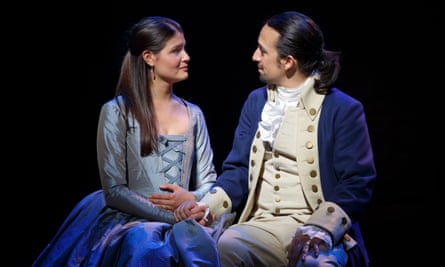
Miranda had already created a successful musical (In the Heights) when he impulsively decided to read Ron Chernow’s prize-winning biography Alexander Hamilton on holiday (Miranda’s whim has made Chernow, who reportedly gets 1% of Hamilton’s profit, a very wealthy man). Hamilton represents something of an anomaly in American history, a founding father who never transferred from official histories into popular mythology. There are many reasons for this, not least that Hamilton’s positions were incompatible with many of our myths – he was avowedly elitist, for example, and supported the idea of a president for life – while his expansion of the federal government prompted the Whiskey Rebellion of 1794, which he brutally suppressed. Neither of these facts makes it into Miranda’s musical, which is the story of a “young, scrappy and hungry” immigrant from the West Indies who became the quintessential American success story through a combination of brains, hard work and audacity. Miranda creates a myth for Hamilton by celebrating him as a symbol of immigrant inclusiveness, egalitarianism and meritocracy: historically it’s a stretch, but theatrically it’s genius.
Eventually Hamilton became a hero of the American revolution, George Washington’s right-hand man, the nation’s first secretary of the treasury, the co-author (with James Madison) of The Federalist Papers, and the primary proponent for federal government over state government. He argued for a national bank, created the national reserve as well as the national debt, and laid the foundations for the US’s economic success. His dramatic life came to a melodramatic end when he was killed in a duel by the sitting vice president, Aaron Burr. And yet, despite all these achievements and dramas, Hamilton has been marginalised by most popular accounts of American history. Washington, Jefferson, John Adams have been the subject of countless books, films, miniseries and even their own popular musical, 1776. But 1776, which tells the story of the battle over writing the Declaration of Independence, does not even mention Hamilton.
That sidelining resonated with Miranda, himself the son of Puerto Rican immigrants, as an emblematic instance of the nation’s treatment of immigrants, both as individuals and as a collective part of the nation’s history. Those twin intuitions sparked a musical about historical, cultural and political inclusion, in which an almost entirely non-white cast plays the founding fathers (and a few of the mothers, although the cast is also overwhelmingly male). The result is the most unexpected of phenomena: a Broadway hit that is about political, economic and racial history while also offering an implicit but acidic running commentary on the racial and cultural politics of the US today. Everything about the show is “meta”, as layered references compound meaning like interest: Hamilton is metatheatrical, metahistorical, metamusical, metamorphic.

Much has been written about Miranda’s wide-ranging but acute musical references, from a Britpop-inflected George III (“When you’re gone, I’ll go mad / So don’t throw away this thing we had / Cause when push comes to shove / I will kill your friends and family to remind you of my love”) to the three Schuyler sisters singing about New York in the manner of Destiny’s Child; from the Notorious BIG to Kander and Ebb. Miranda is conducting a magisterial conversation with musical theatre, which is a kind of microcosm of American popular history, marked in important ways by the mainstream’s appropriation of minority cultures (Show Boat, West Side Story). Hamilton reverses that process, exploring mainstream history through the music of subcultures. Lines about racism from Rodgers and Hammerstein’s South Pacific (“you’ve got to be carefully taught”) rub shoulders with Busta Rhymes; Sondheim’s experiments in perspective from Pacific Overtures meet Snoop Dogg. There is a running gag about Adams, in which Miranda riffs on 1776; its opening number is the resounding “Sit Down, John!” in which the Continental Congress tells him to shut up. Miranda is doing the same, telling Adams and the Anglocentric American history he embodies to step aside. He sidelines Adams, waiting until the second act to mention him, and then has Hamilton sing, “Sit down, John, you fat motherfucker!” Less explicit (in every sense) is Miranda’s decision to give Hamilton a signature refrain – “I will never be satisfied” — that echoes Adams’s line from 1776, “I have always been dissatisfied, I know that.”
Miranda’s lyrics are dizzying: he rhymes Socrates with mediocrities, before linking manumission, abolition and ammunition. Gilbert and Sullivan are not only sampled, they are schooled; Miranda gleefully told a journalist he felt he’d improved the rhyme in Gilbert’s famous patter, which becomes George Washington’s rap: “Now I’m the model of a modern major general / The venerated Virginian veteran whose men are all / Lining up, to put me up on a pedestal.” Puns abound with the exuberant energy of a word-drunk writer: “Local merchants deny us equipment, assistance / They only take British money, so sing a song of sixpence.”
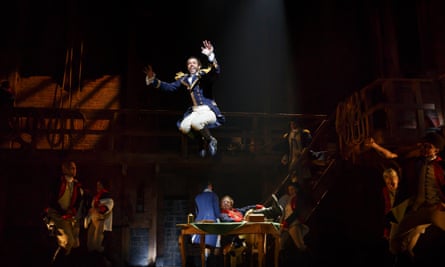
Almost all of Hamilton is sung through, as opera: there is very little spoken dialogue, and much less rap than some accounts might suggest. When rap comes in, it is with “practical tactical brilliance”, as when Miranda turns cabinet debates into rap battles, in which Jefferson and Hamilton face off and drop the mic, in reference to Eminem’s 8 Mile. Hamilton and Burr’s fatal duel is likened to gang violence by sampling the legendary “Ten Crack Commandments” by Notorious BIG, himself notoriously the victim of gang violence. “It must be nice to have Washington on your side,” sung by Burr, Jefferson and Madison, is ostensibly about President Washington’s patronage of Hamilton, but it also becomes about modern disenfranchisement, alienated citizens who feel that Washington DC is not on their side. A song called “Wait for It” is about Burr’s character, but it is also about – wait for it – how destructive it has been for communities of colour to be told to wait their turn.
As with the lyrics, the music is used to make historical points, rather than simply to score points. Jefferson and Burr each have a standout solo in the second act. (Miranda is markedly generous, giving his co-stars most of the best songs.) Returning from Paris, Jefferson sings “What’d I Miss?” over boogie-woogie piano with riffs on other Dixieland jazz sounds, including stride and ragtime. Its invocations of the origins of jazz as the kind of grandfather of rap are at once facetious – as performed by Daveed Diggs, Jefferson even uses “jazz hands” – and serious. Because Jefferson was considerably older than Hamilton and his contemporaries, Miranda gives the younger characters hip-hop influences, while Jefferson sings old-school jazz, which also lets Miranda tip his hat to classic performers such as Cab Calloway, whose vocals pointed the way to rap. As the act progresses, Jefferson’s influence on Burr deepens. By the time Burr breaks out into his great second act number, “The Room Where It Happens”, his musical style has subtly shifted, as he picks up Jefferson’s Dixieland jazz. Burr’s song is the kind of gospel-inspired, choir-backed showstopper that composers have used for more than a century in American musical theatre to get audiences on their feet, from Cole Porter’s “Blow, Gabriel, Blow” to Frank Loesser’s “Sit Down, You’re Rockin’ the Boat”. But unlike those songs, which are great fun but almost entirely meaningless, “The Room Where It Happens” is a foot-stomping, barnstorming, surge-to-your feet instant classic about – the historical record.
It’s a turning point in the show in many senses: Burr stops waiting for it, and the gaps in the historical record become a metaphor for political exclusion. “The Room Where It Happens” is about the way in which historiography constructs mythologies of power, and it’s about realpolitik, how politics gets done. Burr sings, “No one really knows how the / Parties get to yes / The pieces that are sacrificed in / Ev’ry game of chess / We just assume that it happens / But no one else is in / The room where it happens”, before launching into his power verse: “I wanna be in / The room where it happens / The room where it happens.”
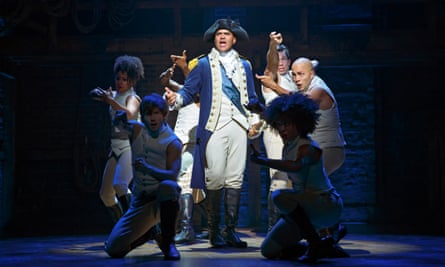
Miranda is putting immigrants and the descendants of slaves, black people, Latinos and Asians, low-income kids with little hope for the future, in the room where it happens. The ambitious individual left out of the “smoke-filled room” becomes the emblem of entire groups excluded from power. “We want our leaders to save the day – / But we don’t get a say in what they trade away / We dream of a brand new start – / But we dream in the dark for the most part.” The song encapsulates the entire musical, which continually raises questions of historiography and the power to shape a national narrative. Hamilton’s wife, Eliza, initially wants to take her place in history – “Oh, let me be a part of the narrative / In the story they will write someday” – but when Hamilton betrays her, she burns their letters, to control the narrative. And then in the end, when Hamilton has died far too young, Eliza sings, “I put myself back in the narrative”. Miranda returns in closing to the question of competing historical versions in a song in which Washington, Jefferson, Madison and Eliza all admit that what matters is, “Who lives, who dies, who tells your story? Will they tell your story? … Who tells your story?”
The question of what gets left out of the narrative is one that can also be asked of Hamilton’s own mythmaking, however. Although Miranda invokes popular histories to accuse them of colour blindness, the fact is that even 1776 confronted the question of slavery far more directly back in 1969 than Hamilton does today. To be sure, 1776 features an all-white cast arguing about whether slavery is bad; Jefferson terribly misses his terribly blond wife and can’t write the Declaration of Independence until she joins him, while his slave Sally Hemings, who probably mothered six of his children, is never mentioned. But 1776 also ends on “Molasses to Rum”, a startlingly frank and brutal account of the triangle trade, and an indictment of the north’s hypocrisy about slavery. Hamilton does mention Hemings – once – and has some other references to slavery, but strongly implies that only Jefferson owned slaves, while suggesting that Hamilton was a far more dedicated abolitionist than the record shows. In fact, Washington and Madison also owned slaves, while Hamilton bought and sold slaves for his wife’s family, and was inconsistent in regards to manumission.
Hamilton features black and brown actors, but its story never depicts a slave. That said, it’s also true that minstrelsy is crucial to Miranda’s project: he takes the long American minstrelsy tradition of white people in blackface on stage and reverses it. He appropriates its music, rewrites its lyrics, turns its politics on its head, and fashions the whole thing into a show that is simultaneously an excoriation of current American political realities, an encomium to American revolutionary energies, and a celebration of American musical theatre history. If you live in Britain, you will have to wait until next November for it, but when it comes, believe me, you’ve gotta be in the room where it happens.
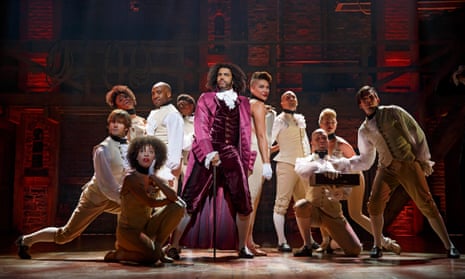
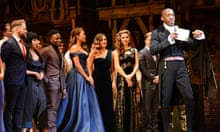



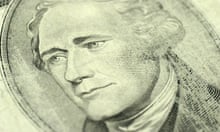




Comments (…)
Sign in or create your Guardian account to join the discussion